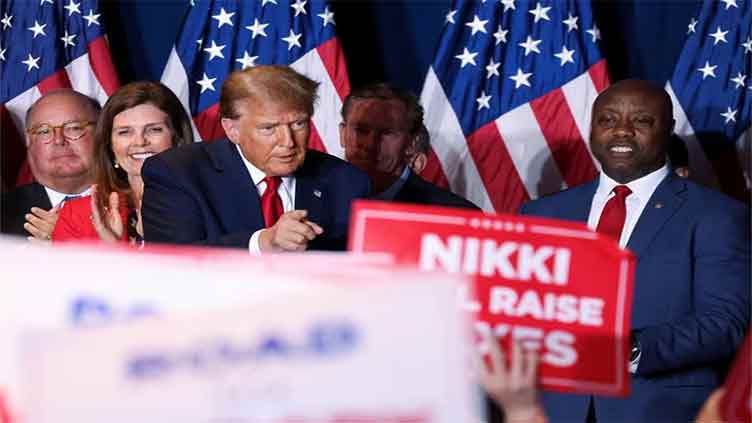How Trump defeated Nikki Haley in her home state of South Carolina

World
How Trump defeated Nikki Haley in her home state of South Carolina
(Reuters) - Donald Trump's big primary victory on Saturday over Nikki Haley in her home state of South Carolina was the result of a ruthless and methodical campaign to eliminate her as a threat, according to aides and people close to both campaigns.
Despite having already secured a string of primary victories, it was crucial for Trump to win South Carolina, a key early Republican primary state that often predicts the party's nominee. Unlike in 2016, Trump was facing a rival who had won two terms as governor of the state and is still locally popular.
The plan was to isolate Haley politically by locking down endorsements from scores of officials in the state as quickly as possible to demonstrate publicly that she had no path to the presidency through South Carolina, aides with knowledge of the Trump campaign plan said.
Trump's victory on Saturday was not a complete blowout but he still defeated her by a comfortable 20 percentage points on her home turf.
"What happens in the state after we're on the airplane. That's where the real work begins," LaCivita said.
Working out of a nondescript office park in North Charleston, campaign staff have been toiling for months to use voter data to communicate regularly with potential voters. Trump used a similar game plan to win in Iowa and New Hampshire.
ENDORSEMENT WINDFALL
As recently as December, Haley was still saying publicly that South Carolina was where she would finally score a win over Trump and turn the nominating contest around. Instead, it may be remembered as the state where her campaign suffered its fatal blow.
By Jan. 24 - a month before the primary - Trump had secured the endorsements of 158 current and former South Carolina
Republicans officials, including lawmakers, mayors and sheriffs. By this week Haley had received endorsements from one member of the U.S. House of Representatives, 11 current state lawmakers and two mayors.
"Those endorsements (of Trump) do matter. They are absolutely embarrassing in their numbers for Nikki Haley," the Trump campaign adviser said.
"If you have the local police chief or a city council person evangelizing about President Trump at a barbecue or at a local meeting, it's a force multiplier on our ground game and grassroots efforts," the adviser said.
Spearheading the push to lock up endorsements was the state's governor, Henry McMaster; Ed McMullen, Trump's former ambassador to Switzerland and a veteran of South Carolina politics; and Justin Evans, a state operative who ran Haley's first political campaign in 2010.
The influential South Carolina House of Representatives speaker, Murrell Smith, who endorsed Trump in August 2023, also played a key role in securing endorsements inside the State House, as did the state's lieutenant governor, Pamela Evette.
McMullen said he and other Trump allies began sketching a plan to ensure the former president's total dominance in the state as early as June 2022, months before Trump officially announced he was running for president that November. Haley declared her candidacy in February 2023.
Trump's South Carolina surrogates began contacting every state House and Senate member in May 2023. Lawmakers who were reluctant to endorse Trump were invited to personal meetings with him when he flew into the state, either at airports or other venues.
"The president was very generous with his time, he met with numerous people, it made clear to people he was serious and very much wanted their support," McMullen said.


